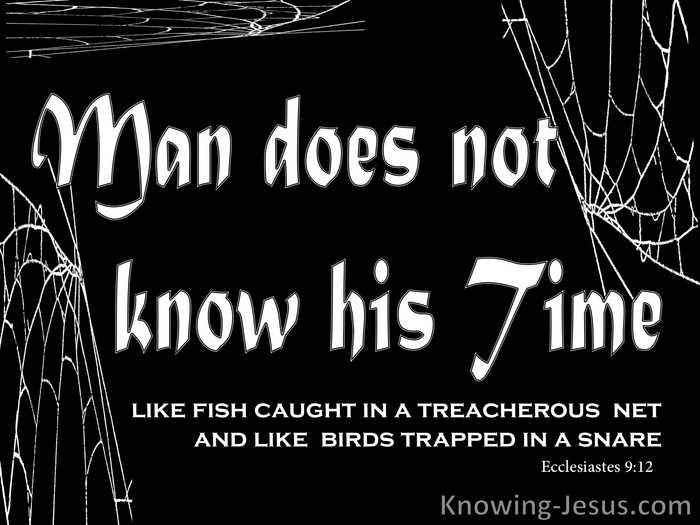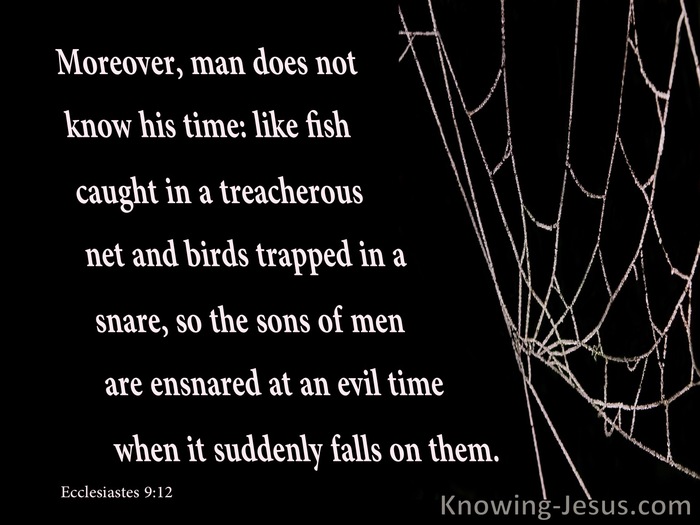◄ What Does Ecclesiastes 9:12 Mean? ►
Moreover, man does not know his time: like fish caught in a treacherous net and birds trapped in a snare, so the sons of men are ensnared at an evil time when it suddenly falls on them.
Ecclesiastes 9:12(NASB)
Verse of the Day
It was most likely King Solomon who penned the unusual book of Ecclesiastes. God granted the young king the gift of wisdom and discernment, and there is much in his writing that pertains to the value of acquiring godly wisdom. But as one traces the life of this famous and fabulously wealthy king through Scripture, we discover that he did not always make the best choices in his own life, as king of Israel. And despite his great gift of wisdom, he often exhibited flawed human logic, rather than wise, godly discernment.
During his life, Solomon used his position, power, and prosperity, in an effort to discover the meaning of life. He did this by exploring many different avenues of productive employment and trivial entertainment. But Solomon foolishly strove to do this by his own human effort, instead of trusting the Lord to guard his heart and guide his steps. However, the resounding result of his in-depth lifelong search into the mysteries of life, which was recorded in the little book of Ecclesiastes, was that without God, everything in life was meaningless.
In his search for meaning and truth, Solomon often adopted a human mindset and explored the meaning of life using the world's frame of reference, rather than a heavenly one. In his rigorous pursuit of understanding, Solomon determined that one's labour is often motivated by inappropriate incentives, and that fleshly passions are fleeting and futile.
He concluded that the pursuit of politics and religiosity are vain and valueless, and that the cycle of life and death is unaffected by a man's position, power, prosperity, or poverty, for all are destined to die. He even considered that being dishonoured in life was better than being celebrated after death, suggesting that he would rather be a living dog than a dead lion!
Based on his own, personal perspective, Solomon lamented the many injustices in life, and bitterly complained that it is not always the swiftest runner that wins a race, nor the strongest army that triumphs on the battlefield. He protested that it is not always the wise and intelligent individual that has food on the table and money in their pocket. He further complains that skilled workers are not always given the recognition they justly deserve.
Because we live in a fallen world, we discover that many of Solomon's findings are correct. However, because he often excluded God from his research and looked at things from a human perspective, he concluded that life was empty and meaningless, and in this verse he compares human injustices with a little fish caught in a treacherous net, or a bird entrapped in some hidden snare: "Man does not know his time," he wrote: "Like a fish caught in a treacherous net or birds trapped in a snare, so the sons of men are ensnared at an evil time when it suddenly falls on them."
In one part of his extensive research, Solomon likened a little fish caught in a net or a pathetic creature captured in a snare, with lost humanity, whom he described as being: "Helplessly entangled in an evil time." While Solomon observed that we can all be caught up in life's injustices, and that time and tide wait for no man, we recognise that he foolishly excluded God from his dialogue.
While Solomon lamented that chance opportunities can never be predicted and that unseen calamities will often bring men's strivings to nothing, we notice that he based most of his conclusions on his own, human wisdom, while omitting God from His reasonings, which resulted in an attitude of futility and hopelessness.
Throughout most of his discouraging dialogue, Solomon demonstrated that human effort is futile and that nothing in this life has any permanence or lasting security. However, behind all of his research, we can see that the history of man's failure is a result of man's own self-effort, striving, and human pride, which happens because God is excluded from people's lives. It is really man's ignorance of God's plans and purposes for humanity that fed into Solomon's disturbing conclusions.
The entire book of Ecclesiastes appears to cover how the injustices and disadvantages of life are common to all people, and that no one escapes the final consequences of being born into the human race (no one escapes death). But through it all, Solomon is able to reach a wise and godly conclusion when he finally acknowledges the need to stop self-strivings, to fear God, and to allow the Lord to guard our hearts and guide our steps.
The important lesson of Ecclesiastes is that no amount of learning, experience, wealth, privilege, or power, can compare with the secure position we have in Christ - but that when wisdom, skill, prosperity, and power, are under God's sovereign influence and subject to His control, then life has meaning. May we take to heart this compelling message of Ecclesiastes; that life is meaningless without the Lord sitting on the throne of our lives, but when God is put in His rightful position in our heart, then we are kept by His almighty power.
My Prayer
Heavenly Father, thank You that my life has meaning in Christ, for without Him I am nothing. Help me not to chase after the wind and engage in futile matters that have no permanence or lasting security. Thank You that in Christ I have all I need to make my life meaningful and productive, and I pray that in all I say and do, my life may be lived to honour You, and to glorify Your holy name. This I ask in Jesus' name. AMEN.
Choose a Verse from Ecclesiastes 9
Ecclesiastes 9:12 Further Study
- Ecclesiastes 9:12 in the Parallel Bible
- Ecclesiastes 9:12 in the Thematic Bible
- Ecclesiastes 9:12 Cross References
- Ecclesiastes 9:12 Treasury of Scripture Knowing
- Ecclesiastes 9:12 Sermons
- Ecclesiastes 9:12 Prayers
- Ecclesiastes 9:12 Images
- Choose Chapter
Never miss a post















